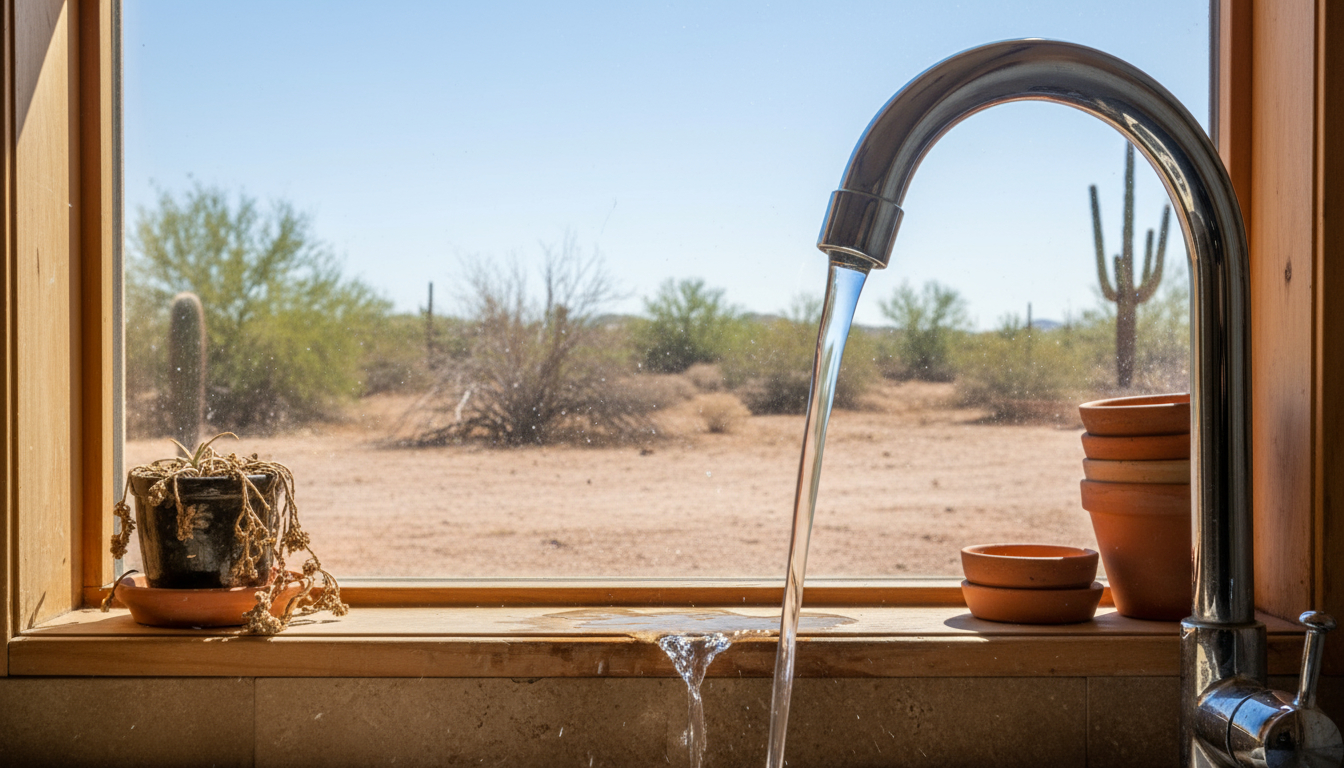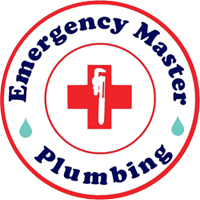

In Arizona’s arid climate, where water is a precious resource, even a single dripping faucet can contribute to significant environmental strain by wasting thousands of gallons annually. Fixing leaky faucets not only conserves water but also reduces energy consumption and protects local ecosystems, offering substantial benefits for both the planet and homeowners.
This comprehensive guide explores the environmental advantages of addressing faucet leaks promptly, tailored to Arizona’s unique challenges, while providing practical solutions to implement today.
Understanding Leaky Faucets and Their Hidden Impact
Leaky faucets seem minor, but they represent a widespread issue that exacerbates water scarcity worldwide, including in water-stressed areas like Arizona. A faucet dripping once per second can waste more than 3,000 gallons of water each year, equivalent to the annual water needs of a small family.
In the United States, household leaks collectively squander nearly 1 trillion gallons of water annually, straining municipal supplies and increasing the demand on treatment facilities. This waste is particularly problematic in arid regions, where every drop counts toward sustaining life and agriculture.
Beyond immediate loss, untreated leaks lead to broader ecological disruptions, such as depleting groundwater aquifers that Arizona relies on heavily. Pollutants from corroding pipes can enter water systems through leaks, compromising quality and harming aquatic life downstream. By fixing these issues early, homeowners directly mitigate these cascading effects.
Arizona’s Unique Water Scarcity Challenge
Arizona faces severe water shortages due to its desert environment, rapid population growth, and reliance on the Colorado River, which supplies much of the state’s water. Leaky faucets amplify this crisis by contributing to unnecessary demand on limited reserves, with the state already implementing strict conservation measures.
In Phoenix and surrounding areas, hard water and high temperatures accelerate faucet wear, leading to more frequent leaks that waste up to 35 gallons per month from a slow drip. This not only burdens the Central Arizona Project but also accelerates groundwater depletion in basins like the Salt River Valley.
Climate change intensifies these problems, with rising temperatures increasing evaporation rates and reducing natural recharge of aquifers. Fixing leaks helps preserve these vital resources, supporting Arizona’s sustainability goals outlined in state water plans. Homeowners play a key role here, as collective small actions can save millions of gallons statewide.
How Fixing Leaks Directly Conserves Water
Repairing a leaky faucet is one of the simplest ways to conserve water, preventing up to 10,000 gallons of annual waste per household from multiple fixtures. In Arizona, where water use is heavily regulated, this action aligns with EPA WaterSense programs aimed at reducing residential consumption.
Consider a typical scenario: a bathroom faucet leaking 10 drips per minute wastes over 500 gallons yearly, enough to fill a small swimming pool. By tightening washers or replacing O-rings—common culprits in Arizona’s mineral-rich water—homeowners can stop this flow immediately.
Long-term, widespread repairs reduce the need for new infrastructure, like dams or pipelines, preserving natural habitats along rivers. This conservation extends to irrigation systems often connected to home plumbing, ensuring more water reaches landscapes without excess loss. Ultimately, fixing leaks empowers individuals to combat drought conditions proactively.
Energy Savings and Lower Greenhouse Gas Emissions
Treating and pumping water to replace what’s lost from leaks consumes vast amounts of energy, contributing to Arizona’s carbon footprint. A single household’s leaks can require energy equivalent to running a household appliance nonstop for days.
In Arizona, where power plants and desalination efforts already strain the grid, wasted water means more electricity for purification—up to 3% of the state’s total energy use tied to water management. Fixing faucets cuts this demand, reducing emissions from fossil fuel-based plants common in the Southwest.
For hot water leaks, the impact doubles, as reheating wasted water adds to natural gas or electric bills while emitting more CO2. Studies show that leak repairs can lower a home’s energy use by 5-10% indirectly through water efficiency. This shift supports Arizona’s clean energy initiatives, fostering a greener future.
Protecting Local Ecosystems and Wildlife
Leaky faucets indirectly harm Arizona’s delicate ecosystems by overexploiting shared water sources, leading to lower river flows and dried wetlands. In the Sonoran Desert, reduced aquifer levels affect species like the endangered Gila topminnow, which depend on consistent water availability.
Pollution from leaks introduces contaminants into soil and groundwater, eroding habitats and promoting invasive species growth in altered moisture conditions. For instance, excess seepage can cause soil salinization, disrupting native plants vital for desert biodiversity.
By conserving water through repairs, homeowners help maintain balanced ecosystems, supporting bird migration routes and pollinator habitats strained by drought. This preservation effort aligns with federal protections under the Clean Water Act, benefiting Arizona’s natural heritage.
Arizona’s riparian areas, such as those along the Verde River, are particularly vulnerable; leak-induced waste accelerates their degradation, reducing carbon sequestration from vegetation. Prompt fixes thus safeguard these biodiversity hotspots for future generations.
Additional Benefits: Soil Health and Broader Sustainability
Beyond direct water savings, fixing leaks prevents soil erosion from chronic moisture imbalances, a concern in Arizona’s sandy terrains. Uncontrolled seepage can destabilize foundations and wash away topsoil, releasing stored carbon into the atmosphere.
In urban settings like Tucson or Scottsdale, leaks contribute to higher urban heat islands by necessitating more concrete infrastructure for water delivery. Repairs promote sustainable landscaping, allowing xeriscaping that thrives on conserved water.
Globally, reducing leak-related waste supports UN Sustainable Development Goals for clean water, with Arizona leading by example through local ordinances. Homeowners gain peace of mind knowing their actions bolster regional resilience against climate variability.
Practical DIY Tips for Fixing Leaky Faucets
Start by turning off the water supply under the sink to safely inspect the faucet. For compression-style faucets common in older Arizona homes, remove the handle and replace the worn washer—a $5 part that stops drips instantly.
Use plumber’s tape on threads to prevent future mineral buildup from hard water, extending fixture life. Test for leaks by running water post-repair; if dripping persists, check the aerator for clogs using vinegar soak.
Tools needed are basic: adjustable wrench, screwdrivers, and replacement kits available at local stores. Follow EPA guides for step-by-step videos to ensure compliance with efficiency standards. These fixes typically take under 30 minutes, empowering quick environmental wins.
Regular maintenance, like annual checks during monsoon season, prevents issues from heat expansion. If unsure, document the problem with photos for professional advice.
When Professional Help is Essential
While DIY works for simple drips, complex issues like cartridge failures in modern faucets require expert intervention to avoid further damage. In Arizona’s hard water areas, professionals use specialized tools to detect hidden corrosion.
Hiring a licensed plumber ensures compliance with state codes, preventing environmental hazards from improper repairs. Look for WaterSense-labeled pros who prioritize efficiency.
Early professional fixes save on water damage repairs, which can cost thousands if mold develops. Schedule inspections bi-annually for peace of mind.
Conclusion: Take Action for a Sustainable Arizona
Fixing leaky faucets delivers profound environmental benefits in Arizona, from conserving scarce water to cutting emissions and protecting ecosystems. By addressing these common issues, you contribute to a more resilient state while enjoying lower bills and a healthier home.
For reliable, expert plumbing services in Arizona, contact Emergency Master Plumbing & Air at 623-584-4706. Their team specializes in swift leak repairs, ensuring your home stays efficient and eco-friendly.
